Caitlin Clark marketing boom is celebrated but also draws questions of race and equity
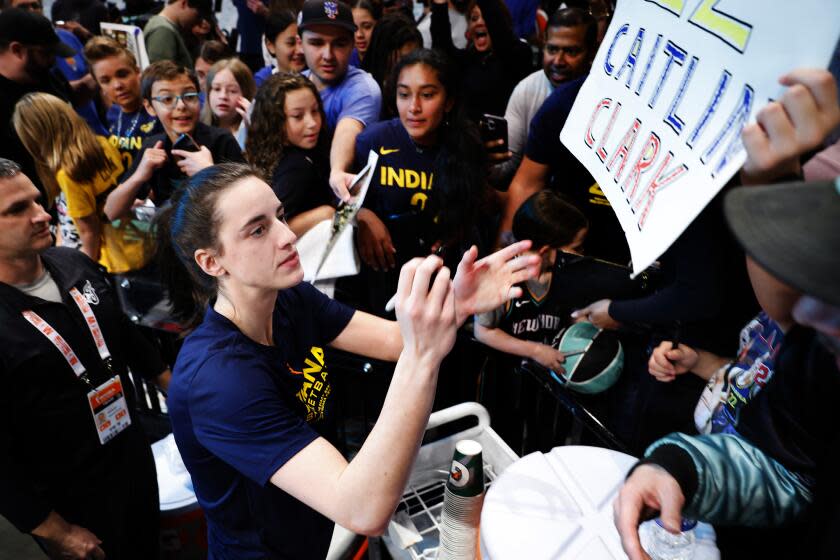
Women’s basketball has never seen anything like Caitlin Clark, the sweet-shooting rookie guard for the WNBA’s Indiana Fever. She’s Taylor Swift with a jump shot, Mia Hamm in a singlet; a figure so transcendent she is changing her profession.
More than 55,000 people showed up to watch her play a practice game last fall and her final college game drew 24 million TV viewers this spring. That’s 3 1/2 times larger than the audience for Serena Williams’ final tennis match.
More than 3 million people tuned in on ESPN just to watch her get drafted. After that, Nike signed her to the most lucrative sponsorship deal in women’s basketball history, a $28-million agreement that includes a signature shoe. Michael Jordan’s first deal with Nike was worth less than a tenth of that.
So what makes the pony-tailed Clark, just 22, so special? Sure, she’s the leading scorer in women’s college basketball history, but how many people have heard of Lynette Woodard, the woman she passed? And for all of her individual accomplishments, she has never won a state or national team title.
What really makes her stand out is the fact she almost blends in. Despite her talents, at 6 feet and a slender 152 pounds she’s one of the smallest players in the WNBA.
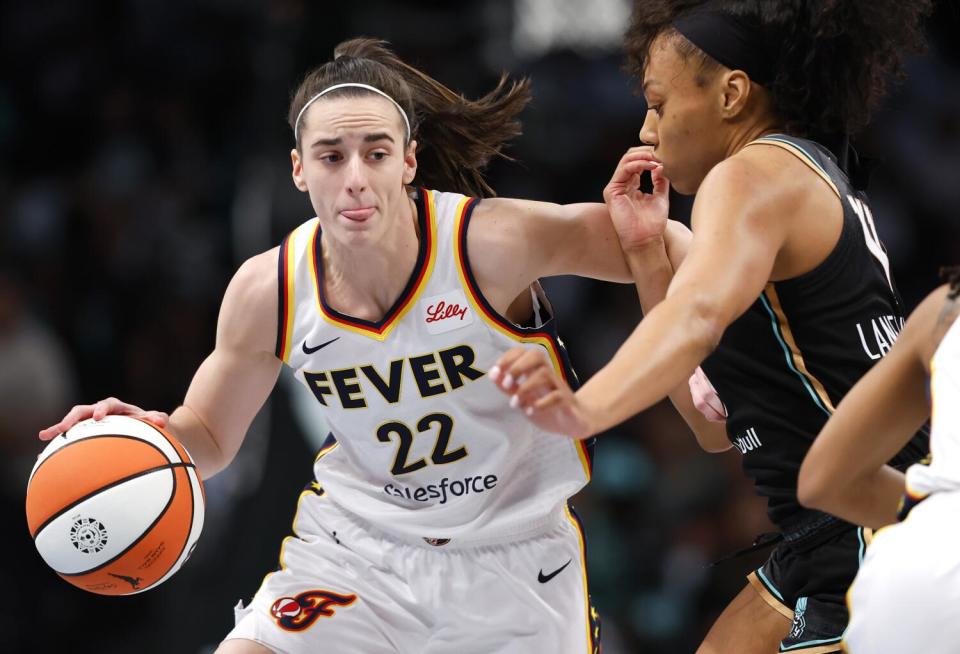
“She looks like your mom,” said Ann Bastianelli, a professor of marketing at Indiana University and a former college basketball player. “These women who are well over six feet and strong and athletic and determined and all of these other sorts of things, I think are scary to lots of men and I think they would be scary to lots of people who have very firm and rigid views of gender and sexual stereotypes.”
And while Clark passes and shoots with laser-like precision the way NBA star Stephen Curry does, she makes it look so easy that everyone thinks they can do it.
“People love Steph Curry because he’s the Everyman,” said Jemele Hill, an Emmy-winning sports journalist and former ESPN personality. “Caitlin Clark has the same relatability.”
But Clark, who will lead the Fever against the Sparks on Friday at Crypto.com Arena, also stands out for who she’s not. In a league in which approximately 70% of the players are Black, nearly a third identify as LGBTQ and most come from urban environments, Clark is white, straight and from Iowa.
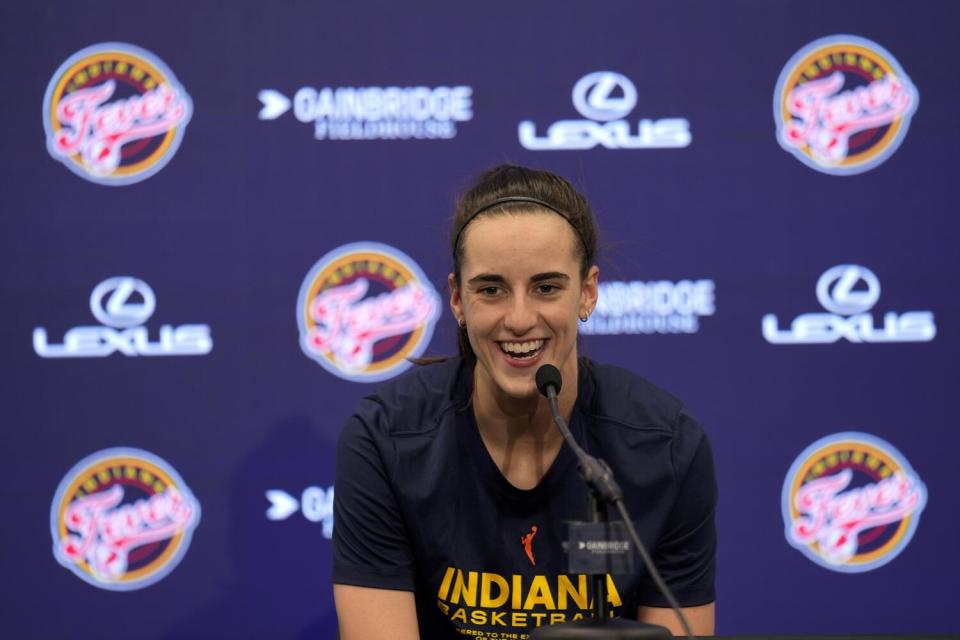
And that sets her apart even more than her shooting skills.
“We would all be very naive if we didn’t say race and her sexuality played a role in her popularity,” said Hill, now a contributing writer at the Atlantic and host of the "Jemele Hill is Unbothered" podcast. “While so many people are happy for Caitlin’s success — including the players; this has had such an enormous impact on the game — there is a part of it that is a little problematic because of what it says about the worth and the marketability of the players who are already there.”
Nicole Melton, co-director of the Laboratory for Inclusion and Diversity in Sport at the University of Massachusetts, agrees.
“Cailtin fits a very comfortable narrative for a lot of people in the United States,” she said. “She comes from the heartland. She’s an amazing talent. She’s also a white, straight woman, right? There's not a lot of things that would make people feel uncomfortable with that person being successful.”
Read more: Granderson: Caitlin Clark is having a moment in women's basketball. She shouldn't be the only one
Except, maybe, in some WNBA locker rooms. For veteran players who have struggled for years with low pay, commercial travel and little media coverage, the attention and riches showered on Clark, who has played only three professional games, has fueled some bitterness. For them, there is more than just basketball at play and their issue isn’t with Clark, but rather the hype machine that has beatified her.
“A lot of people may say it’s not about Black and white, but to me, it is," Las Vegas forward A’ja Wilson, a two-time WNBA champion and two-time MVP, told the Associated Press.
"You can be top-notch at what you are as a Black woman, but yet maybe that’s something that people don’t want to see. They don’t see it as marketable, so it doesn’t matter how hard I work. It doesn’t matter what we all do as Black women, we’re still going to be swept underneath the rug. That’s why it boils my blood when people say it’s not about race because it is."
Asked about Wilson’s comments, Clark chose to deflect the criticism and talk instead about the big picture.
“There's opportunities for every single player in women's basketball," she said. "The more opportunities we can give across the board, that's what's going to elevate women's basketball."
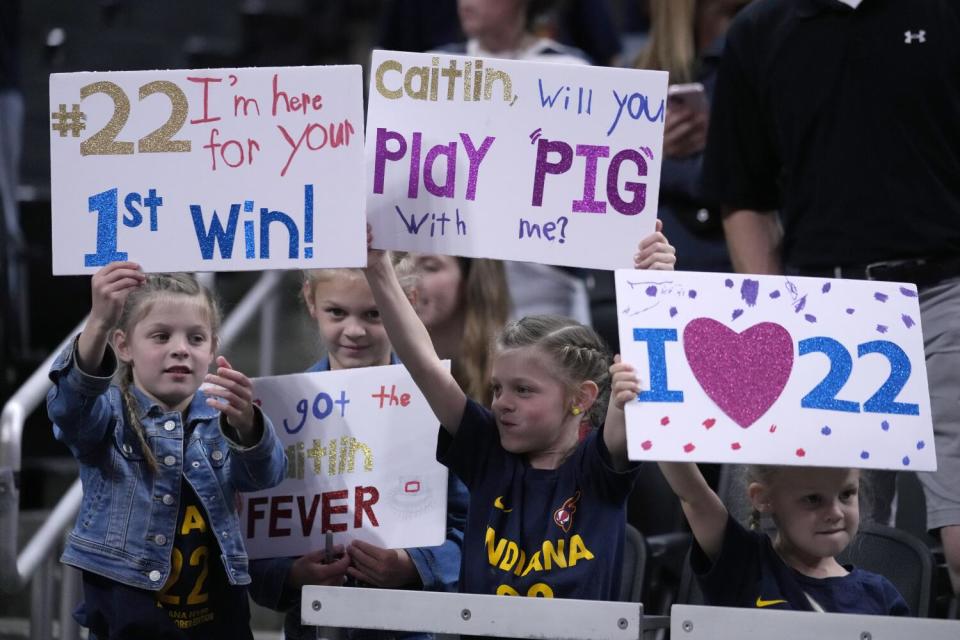
Yet it’s because of players like Wilson that Clark is joining a league primed for explosive growth. The WNBA’s 36 million unique TV viewers in 2023 marked a 27% increase from the previous season while revenue was up about $200 million. And whether by coincidence or coordination, a month after Clark joined the league, commissioner Cathy Engelbert announced teams would be traveling by charter flights this season.
If Clark delivers the WNBA the kind of record-breaking TV audiences she brought to college basketball, that could mean even more money for a league in the final year of its current broadcast deal.
“The boom of social media, there's more accessibility and visibility. And so when you have a phenom like Caitlin Clark, who is kind of a product of that generation, it can certainly bring a lot of great attention,” said Seattle Storm forward Nneka Ogwumike, who is also president of the players’ association.
That, in turn, will mean higher pay and better working conditions for every WNBA player. And while the players welcome that, Hill said it hasn’t stopped many from wondering why talented, charismatic women such as Brittney Griner, Candace Parker and Maya Moore didn’t get the same media attention when they took the league by storm.
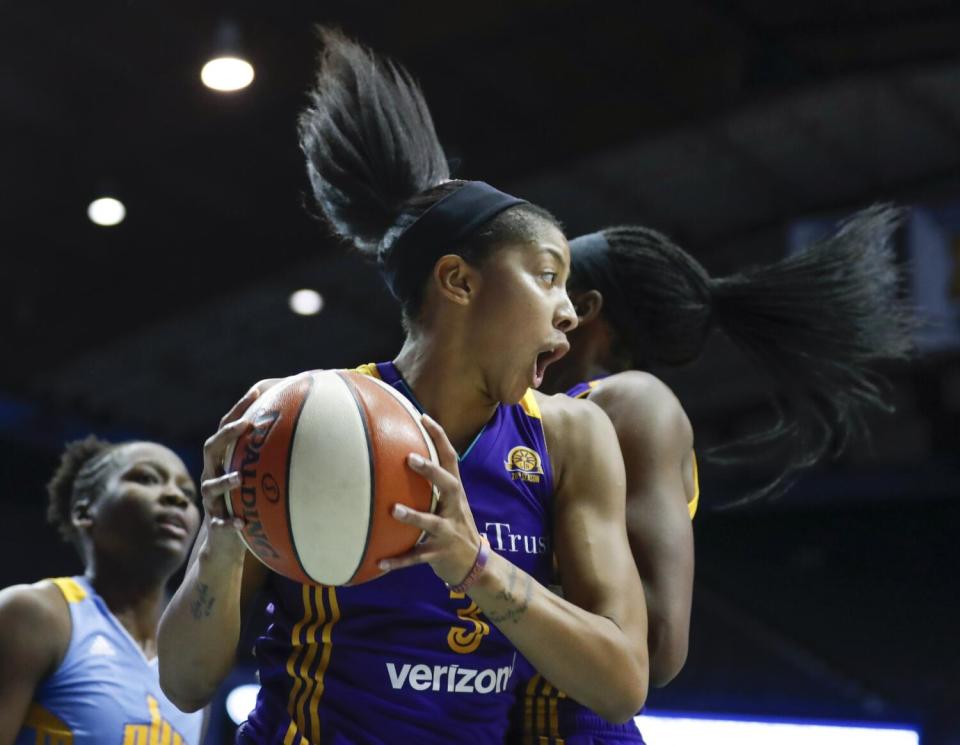
“It's not jealousy. It's just the fact that in our society, Black women are often erased from the picture,” Hill said. “While Caitlin Clark’s success should be widely celebrated, there are various points where we have seen dynamic phenoms and how they have been able to popularize the game. It's just that, for whatever reason, could be race, could be gender, could be a myriad of factors, that same marketing muscle that seems very intentional about making sure that Caitlyn Clark is a superstar was missing for them.
“Coke and Pepsi and all these other brands didn't come running for Cheryl Miller. So I think it's OK to have multiple conversations at once. There's plenty of room to highlight and celebrate Caitlin Clark’s popularity while also discussing ways in which to not erase Black women from a league that they have built and continue to build.”
There is evidence to suggest that erasure is real. Four years ago, Melton and Risa Isard, a research fellow with the Laboratory of Inclusion and Diversity, counted each mention of an active WNBA player in more than 550 online articles from ESPN, Sports Illustrated and CBS Sports and found that Black players received significantly less coverage.
Wilson, for example, who is Black and was the league’s MVP, received half as much coverage as rookie Sabrina Ionescu, the No. 1 draft pick who is white and played only three games that season.
Read more: Plaschke: Gritty Sparks bring new hope and winning effort during their season opening loss
“I do think that's shifting, but it's still there. It's still an undercurrent,” Melton said. “[Clark] kind of stands on the shoulders of all those women that came before, that have been building this narrative and making people realize how great women’s sport is, especially basketball.”
Melton attended Clark’s sold-out WNBA debut, in which she scored 20 points but committed 10 turnovers in a 21-point loss to the Connecticut Sun. Clark scored only nine points in her second game, the Fever's home opener, and her team suffered a 36-point loss to the New York Liberty. Clark bounced back with 22 points during an 11-point loss to the Liberty on Saturday.
Melton found the crowd at Clark's first WNBA game to be far more diverse than the league’s media coverage.
“It was just an amazing environment,” she said. “You had different races, different genders, different sexual orientations. It was a whole melting pot of different people from different walks of life.”
It was, in fact, the kind of diverse crowd the WNBA needs to succeed. And while many of those people had come to watch Clark, they left just as impressed with the play of Connecticut’s Alyssa Thomas, who had a league-record 12th triple-double, and DeWanna Bonner, who moved into fifth place on the league’s all-time scoring list. Ultimately that’s the kind of role the WNBA and its players are hoping Clark will play: a box-office draw who introduces new fans to great talents they might have never heard of.
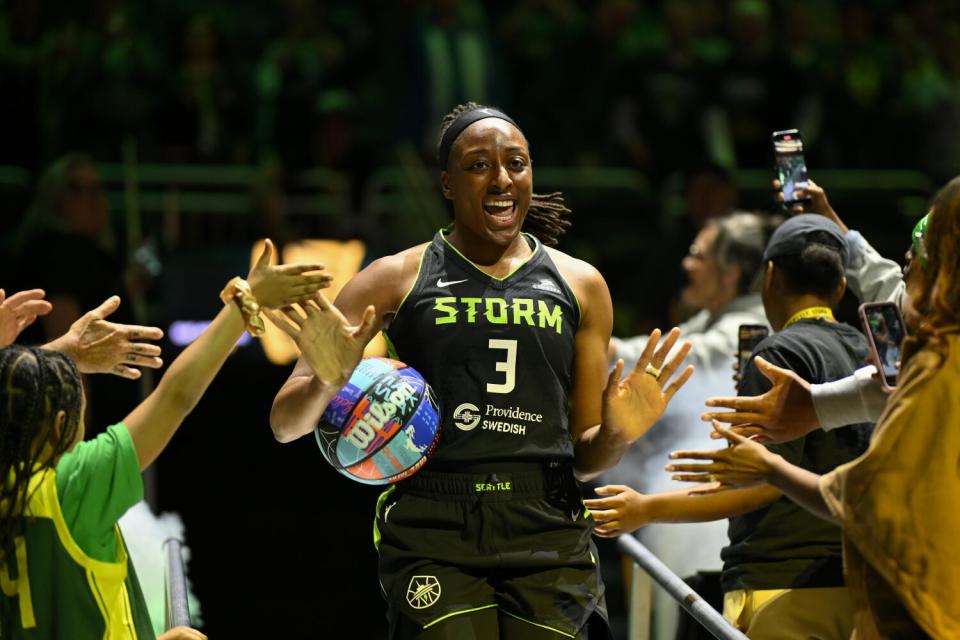
“A lot of people have a gateway into women's basketball right now. And that is going to give them an opportunity to not only come for what they're interested in, but also to find something to discover something that they haven't before,” Ogwumike said. “But however people get interested in women's basketball, they're also now going to discover that there's definitely more than one person that can do a few things in this league that that makes our league as amazing as it is.”
In the meantime, Clark, the league’s poster girl, is being burned by the intense glare of a spotlight she never wanted. All she ever wanted to do was play basketball yet now, like Taylor Swift, she finds herself at the center of political conversations she didn’t start, but ones that are long overdue.
“In that regard, I feel bad for Caitlin Clark because she didn’t ask for any of that,” Hill said.
But, Hill continued, “her success in forcing accountability. And I think that’s a great thing. Now the WNBA has to evaluate everything they do. While it’s shameful that they waited until they got the right player to start behaving in ways they could have been doing all along, the point is that her presence is going to force a level of accountability in the sport that wasn't always there.”
This story originally appeared in Los Angeles Times.

 Yahoo Sport
Yahoo Sport 






































